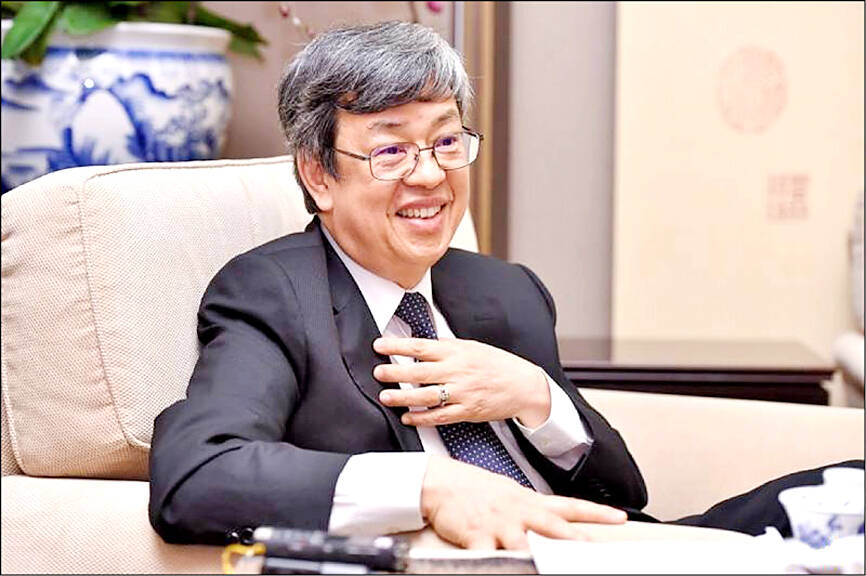The Presidential Office last night confirmed that former vice president Chen Chien-jen (陳建仁) would be the next premier, with a formal announcement to be made tomorrow.
The Chinese-language Liberty Times (the Taipei Times’ sister newspaper) yesterday published an exclusive report saying that Chen had accepted the nomination following a meeting with President Tsai Ing-wen (蔡英文) during the Lunar New Year holiday.
The nomination has to be approved by the Legislative Yuan, with opposition lawmakers vowing to scrutinize his performance if Chen was nominated.

Photo: Chung Li-hua, Taipei Times
Chen accepted the nomination because he believes the Democratic Progressive Party (DPP) must be united for the presidential election in January next year, the report said, adding that the new Cabinet must strive to deliver the best performance within a little more than a year to support the DPP’s presidential candidate.
“I would like to remind the next premier that people would only feel safe and secure if the new premier heeds public opinion, addresses the nation’s rising crime rate and protects the nation’s cybersecurity systems,” Chinese Nationalist Party (KMT) Cultural and Communications Committee head Hung Mong-kai (洪孟楷) said.
“I also hope that the new premier would select Cabinet members from among professionals and experts. He should not pick those who lost in the nine-in-one local elections or from a narrow circle of people,” Hung added.
KMT caucus whip William Cheng (曾銘宗) said that the public would have an even more negative view of the DPP administration if Chen were to lead the Cabinet.
Chen “lacks administrative experience, and he had favored Medigen Vaccine Biologics Corp (高端疫苗),” Tseng said, referring to the developer of a local COVID-19 vaccine, which has been a target of KMT criticism.
“He also made controversial comments while campaigning for other candidates during the nine-in-one elections last year. The KMT caucus will scrutinize his performance and carefully question him when the next legislative session opens next month,” Tseng said.
Taiwan People’s Party Legislator Jang Chyi-lu (張其祿) said Chen would have no “honeymoon” once his nomination is approved.
“The country is experiencing all sorts of problems, from strained cross-strait relations to skyrocketing housing prices, stagnant salaries, delays in US arms sales to Taiwan, and a decline in agricultural and fishery product exports. These issues will have to be addressed immediately once he becomes premier,” Jang said.
DPP Legislator Hsu Chih-chieh (許智傑) said Chen has a positive image as a public health expert.
“As the convener in charge of reforming the pension systems for military personnel, civil servants and public school teachers, Chen showed great communication skills. As a Catholic, he cares for the economically disadvantaged, and knows a lot of people in diplomatic and religious circles,” Hsu said.

TRUST: The KMT said it respected the US’ timing and considerations, and hoped it would continue to honor its commitments to helping Taiwan bolster its defenses and deterrence US President Donald Trump is delaying a multibillion-dollar arms sale to Taiwan to ensure his visit to Beijing is successful, a New York Times report said. The weapons sales package has stalled in the US Department of State, the report said, citing US officials it did not identify. The White House has told agencies not to push forward ahead of Trump’s meeting with Chinese President Xi Jinping (習近平), it said. The two last month held a phone call to discuss trade and geopolitical flashpoints ahead of the summit. Xi raised the Taiwan issue and urged the US to handle arms sales to

A magnitude 5.6 earthquake struck off the coast of Yilan County at 12:37pm today, with clear shaking felt across much of northern Taiwan. There were no immediate reports of damage. The epicenter of the quake was 16.9km east-southeast of Yilan County Hall offshore at a depth of 66.8km, Central Weather Administration (CWA) data showed. The maximum intensity registered at a 4 in Yilan County’s Nanao Township (南澳) on Taiwan’s seven-tier scale. Other parts of Yilan, as well as certain areas of Hualien County, Taipei, New Taipei City, Taoyuan, Hsinchu County, Taichung and Miaoli County, recorded intensities of 3. Residents of Yilan County and Taipei received

Taiwan has secured another breakthrough in fruit exports, with jujubes, dragon fruit and lychees approved for shipment to the EU, the Ministry of Agriculture said yesterday. The Animal and Plant Health Inspection Agency on Thursday received formal notification of the approval from the EU, the ministry said, adding that the decision was expected to expand Taiwanese fruit producers’ access to high-end European markets. Taiwan exported 126 tonnes of lychees last year, valued at US$1.48 million, with Japan accounting for 102 tonnes. Other export destinations included New Zealand, Hong Kong, the US and Australia, ministry data showed. Jujube exports totaled 103 tonnes, valued at

BIG SPENDERS: Foreign investors bought the most Taiwan equities since 2005, signaling confidence that an AI boom would continue to benefit chipmakers Taiwan Semiconductor Manufacturing Co’s (TSMC, 台積電) market capitalization swelled to US$2 trillion for the first time following a 4.25 percent rally in its American depositary receipts (ADR) overnight, putting the world’s biggest contract chipmaker sixth on the list of the world’s biggest companies by market capitalization, just behind Amazon.com Inc. The site CompaniesMarketcap.com ranked TSMC ahead of Saudi Aramco and Meta Platforms Inc. The Taiwanese company’s ADRs on Tuesday surged to US$385.75 on the New York Stock Exchange, as strong demand for artificial intelligence (AI) applications led to chip supply constraints and boost revenue growth to record-breaking levels. Each TSMC ADR represents